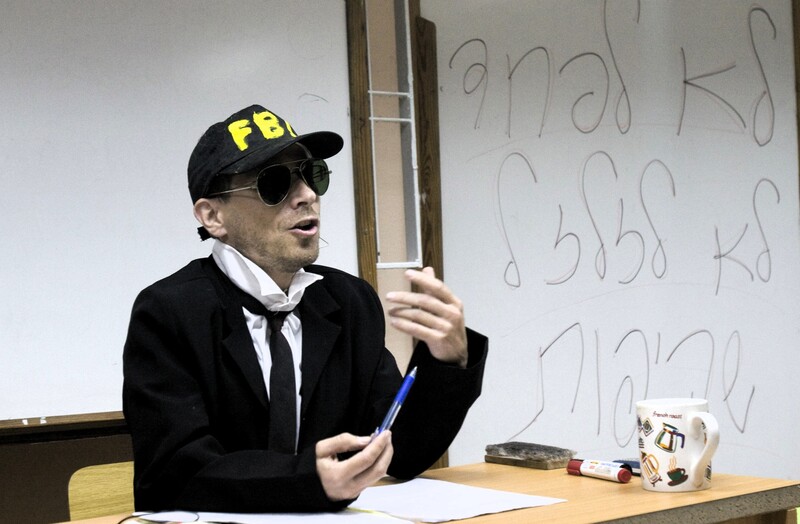Activism and BDS Beat 27 August 2015

Leftist Israeli activists hold a 2008 workshop on how to deal with Shin Bet interrogation.
ActiveStillsAn Israeli spy agency revealed to Haaretz last week that it operates a “delegitimization department” which “routinely gathers information on foreign, left-wing organizations” that promote the Palestinian-led boycott of Israel.
An Israeli activist also told The Electronic Intifada about being questioned by the country’s internal secret police.
Also known by the Hebrew acronym Aman, Israel’s military intelligence branch spies on “overseas organizations … [including] dozens affiliated with the boycott, divestment and sanctions (BDS) movement,” Haaretz states.
The report, by the liberal Israeli newspaper’s military correspondent Gili Cohen, comes at a time when Israel is increasingly worried about the impact BDS is having around the world.
The delegitimization department was established as part of Israel’s response to a global public relations crisis in the wake its attack on the Mavi Marmara in 2010.
The Turkish-owned ship, part of a siege-busting “Freedom Flotilla” to Gaza, was boarded and attacked by Israeli soldiers in international waters, resulting in the death of 10 activists (one of whom had been in a coma until he died last year).
Popular revulsion at Israel’s brutality led to a wave of new boycotts around the world.
This included the bands Klaxons and Gorillaz canceling gigs in Israel, and the UK’s largest trade union Unite adopting a boycott of Israeli goods and services.
“Monitoring”
The monitoring of the BDS movement was previously known, as reported in 2013.
Haaretz had revealed it as far back as 2011.
But the latest report is the first to reveal that there is a specific unit called the “delegitimization department.”
It also confirms that the unit’s monitoring of foreign leftist groups is still ongoing, as activists have long suspected.
Another notable aspect is that part of the unit’s activities has been to gather alleged “proof of Hamas violations of international law.”
Having one department tackle both armed resistance and unarmed BDS activities is a telling pattern.
It fits into the paradigm of the Reut Institute, an influential Israeli think tank which in 2010 argued that Israel should focus on “attacking” the Palestine solidarity movement, as well as “sabotage” of what it calls “network catalysts” in cities such as London and the San Francisco Bay Area.
Reut named the UK’s Palestine Solidarity Campaign as one of the “main catalysts.”
It argued that a “resistance network,” comprising armed groups such as Hamas, and a “delegitimization network,” which includes the BDS movement, together form an “unholy alliance.”
“Sabotage”
The combined “attack” from “resisters” and “delegitimizers,” Reut wrote, “possesses strategic significance, and may develop into a comprehensive existential threat within a few years.”
Five years after Reut published those words, and 10 years after the BDS movement was launched, Israel seems to have concluded that this moment has arrived.
Israel now considers BDS a “strategic threat of the first order,” in the words of the Israeli president.
Reut’s advocacy of “sabotage” suggests that the think tank wanted Israel’s spy agencies to combat activists using possibly illegal methods.
The document which contained this terminology (the Executive Summary to its report “The Delegitimization Challenge: Creating a Political Firewall”) was so clearly advocating criminal action against peaceful campaign groups that Reut later removed the reference to “sabotage,” after widespread attention in the wake of exposure by The Electronic Intifada.
But the original wording is still visible at the Internet Archive and in a copy published by The Electronic Intifada.
Intimidation
Aman’s use of Haaretz military correspondents as a conduit to release information to the public suggests Israeli spies very much want BDS activists to know they are being watched.
This may well be an attempt at intimidation, and a way to exaggerate the scale of their own resources to monitor activists.
The recent Haaretz report also states that Shin Bet (also known as Shabak, a Hebrew acronym for “General Security Service”) is spying on Israeli citizens who support BDS.
“The monitoring of every BDS-linked group is approved in advance by a senior [Aman] officer in the research division, following a decision not to follow groups which have indirect contacts with Israeli activists,” the report claims.
That is done instead by the Shin Bet, “which monitors Israeli citizens involved in what are regarded as delegitimization activities.”
This is likely focused on Palestinian citizens of Israel. But the small numbers of Israeli Jewish dissidents who support BDS in groups like Boycott From Within also report being questioned by Shin Bet.
Harassment
In 2013, the Association for Civil Rights in Israel asked the high court to order Shin Bet to stop calling activists in for “warning conversations” about their “delegitimization” activities.
In one 2012 article, Israeli journalist Amira Hass talked to several left-wing activists who had been interrogated by Shin Bet.
Their accounts of the “friendly conversations” (as Shin Bet tried to portray them) make it clear that boycotts of Israel are one of the domestic spy agency’s main concerns.
Israeli BDS activist Ronnie Barkan told The Electronic Intifada that he has been questioned by the Shin Bet several times, though he refused to answer their questions.
“Our forte is doing everything in the open,” Barkan said. Activists routinely circulate accounts of such interrogations online in order to expose the practice.
On one occasion in 2012, Barkan said, he was called in for questioning by the police. When he turned up it was, he believed, the Shin Bet that tried to question him.
Barkan now lives in Italy.
Another Israeli, Anarchists Against the Wall activist Leehee Rothschild, was interrogated and harassed by Shin Bet officers on her way back from a 2012 visit to London to promote BDS and participate in Israeli Apartheid Week.
Shin Bet also spies on, intimidates, bullies and harasses Palestinian activists within the West Bank. The agency has long been involved in the kidnapping and assassination of Palestinian activists and fighters.
While all these tactics seem unlikely to do any more than delay the movement for Palestinian rights, it does seem likely that as Israel perceives itself to be more beleaguered it will act with increasing recklessness and aggression.






Comments
Cost effectiveness
Permalink Zionism Is Not Judaism replied on
It would be more cost effective, and easier, if they prepared for the return of those families ethnically cleansed in the pogroms of the 1940's and implement the end of zionism-- which is both racist and wrong.
But hey, to borrow from Pete, "when will they ever learn."
a peace project
Permalink Eva Zuk replied on
Why can't Israel make an agreement with Palestinians and end these useless
agressions? both these human groups have the right to exist, even if they are very different.
THE QUINESSENTIAL IMPETUS OF ZIONISMH
Permalink Peter Loeb replied on
History doesn't always provide anything near "answers". In this
case, I would recommend the history of Zionism's ideogology
going even back especially to the late 19th century.
Many anti-Semitic Germans (various groups) excluded Jews
from the territory of the German "Volk" (Aryan dominance)
while some Jews responded by forming their own area of
territorial dominance and complete control including
"right conquest", purity of blood etc.
The choice of Palestine was not immediately popular among
Jews but by alliances with the superpowers of that day
(first the UK, then the US) Zionism achieved its Michiavellian
and essentially undemocratic goals. It may not have always
be stated (for PR reasons) but obviously no "modus vivendi"
(agreement to share) would have been conceivable for the
invading Jewish conquerors.
There was no "Israel" until 1948. Only Palestine. The
Israel which declared itself was immediately recognized
by the US and the USSR.
No "agreement" could ever be conceivable between
Israelis and Palestinians without the guaranteed
dominance and control of Israeli's against a
complete surrender by the indigenous (in this
case Palestinians).
That is "why" Eva Zuk. Sources are many and are
not listed for brevity.
----Peter Loeb, Boston, MA, USA
The delegitimization slogan is a cover for occupation
Permalink Maher A Josephson replied on
I have a suggestion for this department: Become legitimate by obeying international law. You know what I am talking about! Give the Pales their freedom and abandon your "chosen people" mantra. Stop stealing the land and while at it, abolish the department of "ethnic cleansing". Soon Israel (the man) will roll in his grave and nobody knows what will happen. The future of the human race is at stake. Don't let the Armageddon people and the so-called "Christian" Zionists win.
BDS targeted
Permalink tom hall replied on
The executive summary of the Reut report of 2010 is remarkably prescient. The developments most dreaded by the Israeli State have indeed made their appearance. Of course, nowhere in the document is it acknowledged that the Occupation and other gross violations of international law and human rights might be contributing to the deteriorating situation.
It's also interesting to note that a strategy of cultivating wealthy, politically influential elites in key countries is urgently recommended by the Reut Institute. Again, the fact that those elites are despised by the great majority of people living in those countries doesn't seem to play a role in these calculations. This approach will be familiar to anyone with a modicum of knowledge concerning Jewish history in Europe. Aligning your community with the most retrograde forces in the country isn't exactly a guarantee of long-term security. But that's where Zionism seeks its natural allies, at the table of the Prince. And if that Prince is hated by his subjects, well, Israel stands prepared to supply him with an array of technologies of repression. Just keep the money and the diplomatic cover in place.